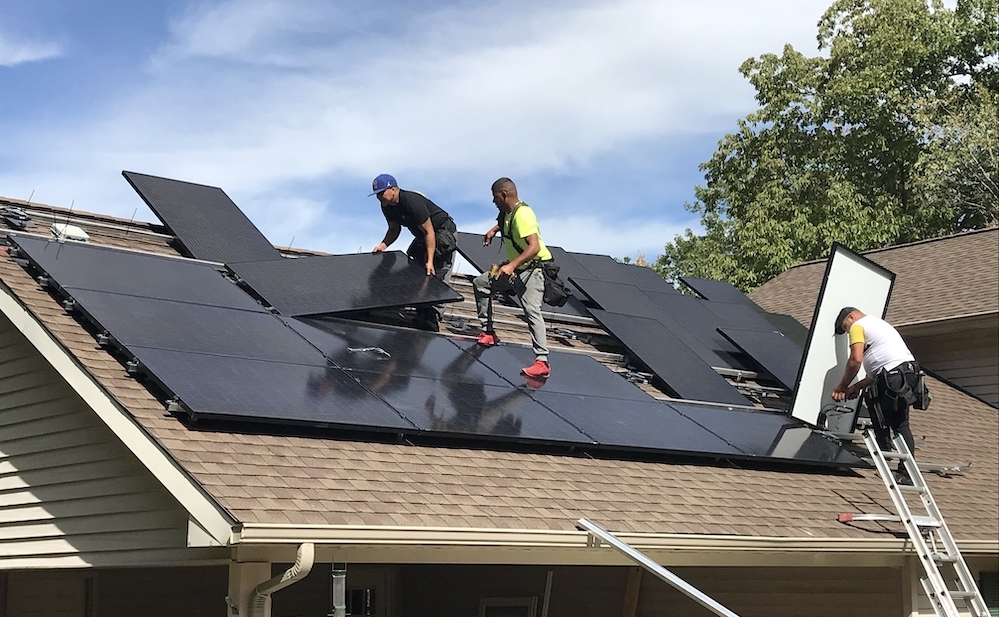Solar energy presents a golden economic development opportunity for communities in Southwest Virginia. To take full advantage of it, policy changes are critical to make sure to minimize needless barriers to renewable energy projects.
In 2018, the solar industry generated a $17 billion investment in the American economy. In Virginia, the advanced energy industry employs 101,400 individuals. Solar jobs in Virginia increased from 3,565 in 2017 to 3,890 in 2018, an increase of 9 percent. That puts Virginia 20th in the nation for solar jobs, though only 34th if measured on a per capita basis.There are many opportunities for Southwest Virginia communities to tap into the billions of dollars in investments happening nationwide, bringing these jobs and investments to our region.
The Solar Workgroup of Southwest Virginia has been working with site owners, solar developers, and experts to implement solar projects across the region for the past 18 months. During that time, local government officials have been working to address local barriers to solar energy development.
In Southwest Virginia, six counties, the City of Norton, and the Town of St. Paul have all achieved SolSmart Designation through the Department of Energy’s SolSmart program administered by the Solar Foundation. The SolSmart program is designed to recognize communities that have taken key steps to address local barriers to solar energy and foster the growth of mature local solar markets.
As of October 2019, Wise County has received silver status, and the other participating jurisdictions (Dickenson County, Lee County, the City of Norton, Russell County, Tazewell County, Scott County, and the Town of St. Paul) have achieved bronze status. There are many opportunities both through and outside of the SolSmart designation process for communities to continue to attract solar jobs and investments.
There are many things that local officials can do to support solar energy development in their communities. Below, I’ve broken down examples of pro-solar policies and programs that can be promoted:
Goals
- Commit your local government to achieving gold SolSmart designation.
- Commit your locality to powering a certain percentage of local-government owned facilities with solar or renewable energy.
Analysis
- Conduct a feasibility analysis for solar PV on brownfields, previously-mined lands, and/or other under-utilized properties.
- Conduct an energy audit of your local-government facilities to identify cost effective energy efficiency investments.
Permitting, Zoning, and Inspections
- Require local permitting staff to implement solar permitting best practices to provide solar developers and installers a transparent, efficient, and cost-effective approval processes that also protects your community’s valuable staff time.
- Exempt solar / renewable energy installations from paying permitting fees.
- Require local building officials to review permitting processes and requirements and provide for streamlined permitting for solar / renewable energy installations.
- Require the local building officials and IT department to develop an online permitting platform.
- Require local building and zoning professionals to improve planning, zoning, and development regulations to provide maximum siting options for rooftop and ground-mounted solar projects while preserving your community’s character and historic resources.
- Require local inspectors to making improvements to and streamlining the solar inspection process while ensuring compliance with state and local codes.
- Provide local inspectors, permitting staff, and building code staff trainings to become familiar with solar, renewable energy, and energy storage technologies.
Building Codes and Standards
- Adopt up-to-date building and electrical codes and standards that provide clear guidance on solar installation requirements and solar-ready construction.
- Provide incentives or require that certain types of new construction be “solar ready.”
- Protect the right to sunlight for current and future solar consumers through solar access ordinances or easements.
- Develop design guidelines for solar PV in partnership with local homeowner associations.
Collaborations and Education
- Open a dialogue with the electric utilities serving your locality to discuss and implement your community’s goals for solar energy, community solar, net metering, and interconnection with local utility. This could include regular meetings with electric utility meetings and community members.
- Administer a local Solarize program, grouping together interested homeowners, businesses, or nonprofits to participate in a group purchase of solar installations to take advantage of bulk discounts.
- Participate in the Solar Workgroup of Southwest Virginia.
- Convene a local energy task force.
- Host a solar workshop open to the general public and/or local government staff explaining solar PV opportunities and policies.
- Provide businesses, homeowners, and nonprofits information on, or expanding, local financing options and incentives. Provide information on your website, send information with utility bills, or consider other options.
- Partner with an organization or business to provide local residents and businesses with energy efficiency audits.
If you have any questions about this, please contact me at chelsea@appvoices.org or visit solsmart.org/contact-us.




Leave a Reply